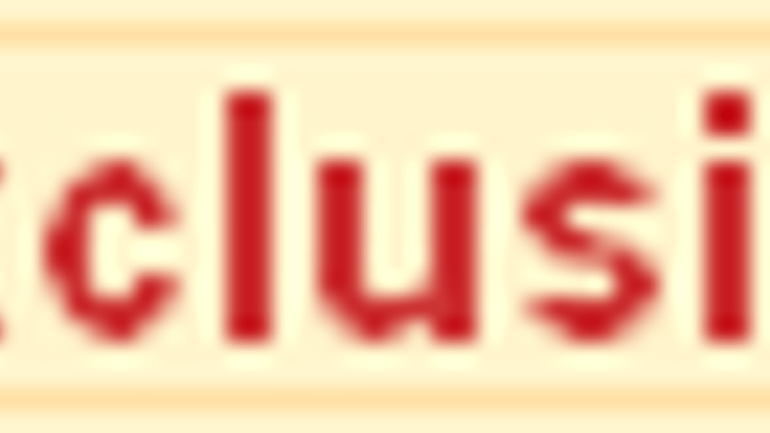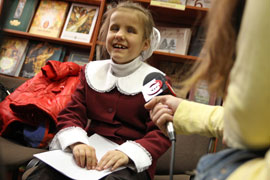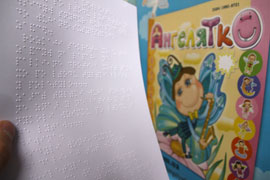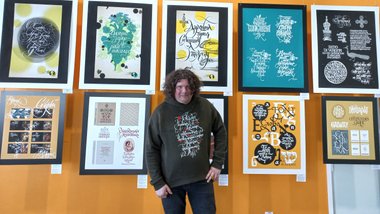Magazine for Blind Children Presented in Lviv

![]()
 The editorial staff of the children's publication Land of Little Angels on December 7 presented in Lviv the first Ukrainian magazine for blind children of a very young age. Little Angel in Braille will appear each month in the form of an inlay in the relief-dot script as an edition of the national Ukrainian children's magazines Little Angel and Little Angel's Schooling.
The editorial staff of the children's publication Land of Little Angels on December 7 presented in Lviv the first Ukrainian magazine for blind children of a very young age. Little Angel in Braille will appear each month in the form of an inlay in the relief-dot script as an edition of the national Ukrainian children's magazines Little Angel and Little Angel's Schooling.
As it was announced during the presentation of the edition, the project is social and not commercial and is also called to adapt children who are blind or visually impaired to life in the society and provide them with possibilities that are provided to healthy children.
According to the chief editor of the magazines, the edition will include materials from Little Angel's Schooling for children studying letters, figures, and the basics of grammar, as well as short fairy tales, stories, poems from Little Angel. The materials are also prepared by modern children's authors, psychologists, educators, and methodologists according to the program of preschool education.
 The chief editor explained that the institutions working with blind children can subscribe to the edition. The price includes only the cost of the magazine itself, without taking into account the Braille inlay.
The chief editor explained that the institutions working with blind children can subscribe to the edition. The price includes only the cost of the magazine itself, without taking into account the Braille inlay.
Chief editor Olena Volosevych explained that "as it turned out, it is more profitable for the state to grant benefits than to change the system which was formed during the Soviet times, when disabled people lived, studied and worked separately. The society knew about them but the people were not in contact with the disabled in everyday life."
Oksana Potymko, the head of the Ukrainian Society of the Blind in Lviv Oblast, noted that "we forget about such a category of the disabled as people who are visually impaired, for whom the question of availability is the permanent question of their whole life; for the persons with poor eyesight, availability concerns education, everyday life and transport."
"At last, we begin, brick by brick, to tear down the wall that used to close visually imparied people in their reservation," said Oksana Potymko.
A children's psychologist of the training complex RozUmNychkA, Hanna Syvyk, said that the main question in the development of children with poor eyesight is their adaptation to their group and relations with the peers. "According to a number of scholars, in case of insufficient social adaptation, blind people suffer from complications, which are reflected in the character of communication," noted the psychologist. And, according to Hanna Syvyk, one of the conditions of harmonious development of children with special needs is the "creation of conditions facilitating their integration into the system of modern social relations."
An educator of the Lviv Boarding School 100 (for blind children), Aleftyna Kozytska, shared her own experience as to the problem of books for blind children: "Most of the books for the blind were published before the independence of Ukraine. All in all, the library of the boarding school has only 290 books published in the 1970s and the 1980s mostly in Russian. Only one third of the children are provided with Braille textbooks. We lack fiction. In 2010, we received only 9 books of which 5 are poems of a blind poet, Tetiana Frolova, who published the poems at her own expense."
The director of the Levenia Educational and Rehabilitation Center for Visually Impaired and Blind Children, Vira Remazhevska, noted that "if we say that we are a European country, we have to have the standards existing in Europe." According to her, it is not so difficult to create a magazine for blind children but "it is important to create a children's magazine interesting for children themselves and make it available for children who read in a different way."








